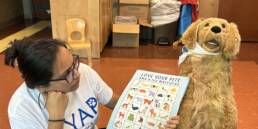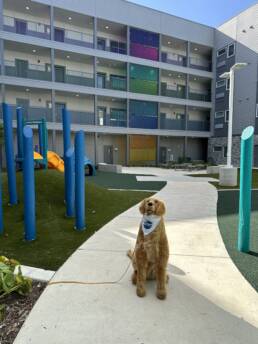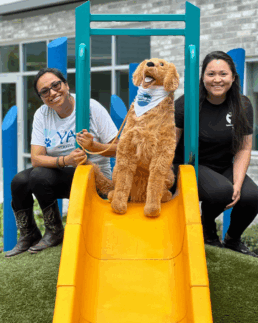Since 2010, Barrio Dogs has worked to create a better future for animals and communities in Houston’s Greater East End by promoting compassion, responsible pet ownership and education. At the Houston Area Women’s Center (HAWC), we share a similar mission: to prevent domestic and sexual violence through advocacy, education and support. The connection between pet abuse and domestic violence is clear. Many survivors report that their abuser also threatened or harmed their pets as a means of control. This pattern of violence is not just a personal issue—it is a public health problem that affects entire families and communities. To truly break the cycle, we must approach it that way, with a united response that promotes empathy, safety, and healing for all.
At HAWC, we believe that prevention starts with education, and the lessons we teach children today shape the relationships they build for the rest of their lives. That is why we are thrilled to team up with Barrio Dogs, a Houston-based nonprofit dedicated to raising awareness about the proper care and treatment of animals. The bond between people and pets is strong. 99% of pet owners consider animals to be “members of the family.”
Abuse, whether directed at people or animals, often shares the same roots: a disregard for the rights and well-being of others, and for abusers to feel a sense of power and control.
In fact, studies show that as many as 89% of domestic violence victims with pets report their abusers threatened, harmed, or killed their animals to maintain control or prevent them from leaving.
Violence at Home Affects Everyone
Animal abusers are 5 times as likely to harm humans. Pets are often “soft targets” because they’re beloved members of the family, especially since women are the primary caregivers for pets in 80% of homes. For many people, pets aren’t just companions; they’re emotional support animals who provide comfort during difficult times. That strong emotional bond is a big reason why teaching empathy and kindness toward animals matters so much when it comes to preventing violence and building safer relationships.
Our collaboration with Barrio Dogs helps children learn important lessons about kindness, consent and boundaries both with animals and with each other. Through hands-on experiences with live dogs and stuffed animals, children practice respectful interaction and build emotional awareness. This nurtures the empathy that can break cycles of violence before they start. Animals can bring comfort and healing. Research shows that pets have many mental health benefits including reducing stress, anxiety, loneliness, and improving mood.
Youth and Paws Program Highlights:
• Biweekly sessions
• Serves Pre-K and K–8th grade groups
• Features stuffed animals plus live dog visits with hands-on demonstrations
• Reinforces safe, respectful interactions both with animals and people
Our first session kicked off Monday, July 21st, and our Pre-K kiddos were delighted to meet Mr. Peanut Butter.
We learned why caring for others, whether furry friends or classmates, matters so much. We cannot wait to welcome the students back this week for more puppy love, learning and connection. Thank you, Barrio Dogs, for your support in helping us build a kinder, safer future. Together we are raising a generation that understands kindness, respects boundaries and values every voice.
Donate today to help us keep these programs going and growing.
HAWC’s prevention and education programs are completely free to our clients. With your support, we can continue to create safe, healing spaces where children learn empathy, respect and healthy boundaries from the very start.
Our hotlines are 24/7.Our services are free of charge.We are here for you.
The gateway to access all services at HAWC is through our 24/7 hotline. Knowledgeable and compassionate advocates are here for you, 24/7, to lend a supportive ear, connect you with services that meet your needs and provide referrals to life-changing community resources.
Domestic Violence Hotline:
(713) 528-2121
1-800-256-0551
Sexual Assault Hotline:
(713) 528-RAPE (7273)
1-800-256-0661







